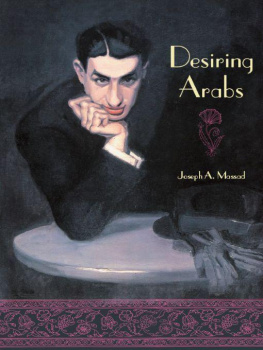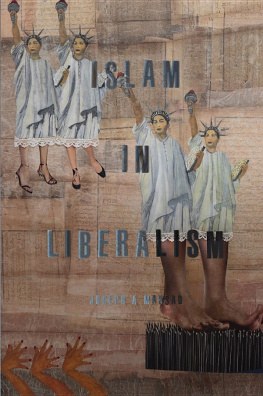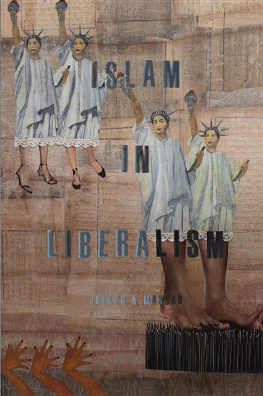COLUMBIA UNIVERSITY PRESS
Publishers Since 1893
New York Chichester, West Sussex
cup.columbia.edu
Copyright 2001 Columbia University Press
All rights reserved
E-ISBN 978-0-231-50570-3
Library of Congress Cataloging-in-Publication Data
Massad, Joseph Andoni, 1963
Colonial effects: the making of national identity in Jordan / Joseph Andoni Massad
p. cm.
Revision of authors thesis.
Includes bibliographical references and index.
ISBN 0-231-12322-1 (cloth : alk. paper)ISBN 0-231-12323-X (pbk. : alk. paper)
1. JordanPolitics and government20th century. 2. National state. 3. National characteristics, Jordanian. 4. JordanEthnic relations. 5. PostcolonialismJordan. 6. JordanArmed ForcesPolitical activity. 7. Culture and law. I. Title.
JQ1833.A58 M37 2001
956.95043dc21
2001028017
A Columbia University Press E-book.
CUP would be pleased to hear about your reading experience with this e-book at .
This book began as a dissertation. I have enjoyed thinking about, researching, and writing it in ways I did not anticipate. When I embarked on this intellectual journey, I thought that I already knew many of the answers to the questions I was posing. In the process, I realized that I knew only few of them, and even then not adequately. I have learned much from this project, not only about nationalism and Jordan but also about myself as a subject of both. It is through working on this project that I came to understand how I became a Palestinian Jordanian . My hope is that this book will serve to explain the process through which the Jordanian people came to see ourselves the way we do.
I have been helped and guided by many colleagues, friends, and family members in the years since this project began. I would like to begin by thanking Lisa Anderson, my professor and advisor, for believing in this project and for supporting it despite her initial misgivings about its unorthodox methodology. Her trust in me strengthened my resolve to proceed and finally to complete this project. Although I was not his student, Timothy Mitchell gave me much of his time and attention. His careful reading of the dissertation chapters and his attention to the historical material as well as my theoretical approach made me rethink a number of contentions I had initially made. His interventions made the final version much richer. I thank him for his support and intellectual engagement.
From Edward Said, I learned much of what I know about culture, representation, and empire. I began reading Edward Said when I was a freshman in college. I only met him eight years later. His work has had the greatest influence on my intellect and my work. His help and support in and out of class went beyond the call of duty. To him, I owe much gratitude, both professional and personal.
My mother has had and continues to have the greatest influence on my life. I have learned much from her about the importance of knowledge and education, about inequality between women and men and between the poor and the rich, about commitment and respect, and most of all about love. I would never have been able to pursue my university education were it not for her personal and financial sacrifices (and those of my father and sisters).
From my father I learned to love languages. Although he learned English and French at school, he taught himself Italian so well that he speaks it as fluently as he speaks Arabic. When my sisters and I were children, my mother and father (both of whom were 1948 Palestinian refugees who, along with their families, fled the Palestinian city of Jaffa to escape advancing Zionist forces, losing all their belongings in the process) would always tell us we do not have wealth to bequeath to you, only education. Even if we had money to bequeath to you, you would spend it. Education, however, will remain with you forever. This dictum is shared by many Palestinian refugees rendered penniless by the loss of their country and homes.
My mother always dreamed of obtaining a university education, a dream that remains unfulfilled. To make it up to herself, she moved heaven and earth to ensure that her children would go. My fathers pride in his childrens academic accomplishments is always manifest. Like my mother, he did not have a chance to obtain a university education.
During my stay in Amman in 1994 and 1995, and during subsequent visits in 1996 and 1997, I received much love and support from my sisters, Suzie, Roula, and Rania, and my nephew and nieces, Samer, Dina, and Nadine. I thank them all for their patience and love.
The intellectual engagement and friendship of Muhammad Ayyub and Jihad Yahya kept me sane at many different moments. Even after I left Amman, Jihad helped procure documents for me that I needed and did not have. The loving friendship I received from Salam Arif Al-Rubayi sustained me throughout that period. All three provided me with much-needed companionship, forming with my family a support system without which Amman would have been a much lonelier place. I thank them all.
In my research efforts, I was helped by a number of people in Amman. I would like to thank Nahlah Abu-Khalaf and Camelia Hattar from the Center for Strategic Studies at the University of Jordan for facilitating contacts and for their professional support despite institutional constraints. I would also like to thank Dr. Nufan al-Humud of the Center for Manuscripts (Markaz al-Wathaiq) at the Library of the University of Jordan for his research help. Abdullah Damdam of the microfilm center at the library of the University of Jordan was tireless in his efforts. He helped me locate many newspaper issues that otherwise would have been impossible to find. His help was truly exemplary. I owe him much gratitude. My research experience was made less lonely by Marc Lynch, who was conducting his own research at the same time in Amman. We shared our high and low points in conducting research, as well as many a bus ride from the University of Jordan.
I would like to thank Dr. Man Abu Nuwwar for sharing with me his recollections as well as his research material, and Dr. Maruf al-Bakhit of the Jordanian Arab Armys General Headquarters (al-Qiyadah al-Amah) for facilitating my access to the library of the Armys Department of Spiritual Guidance (Maktabat Al-Tawjih Al-Manawi).
Rana William Ziyadat, the librarian at Maktabat al-Tawjih al-Manawi, was generous with her time and with extra books from that library. Hani Hurani was also generous with his time and with the publications of the New Jordan Studies Center. I thank them both for their support. My cousins Ninette Arbid and Amin Batshun were very generous with me personally and professionally. The thousands of copies they made for me at their business were offered not only free of charge but with a loving and supportive smile. I will always be grateful to them.



















